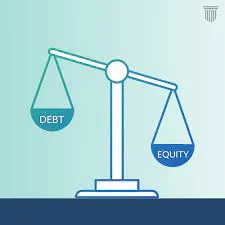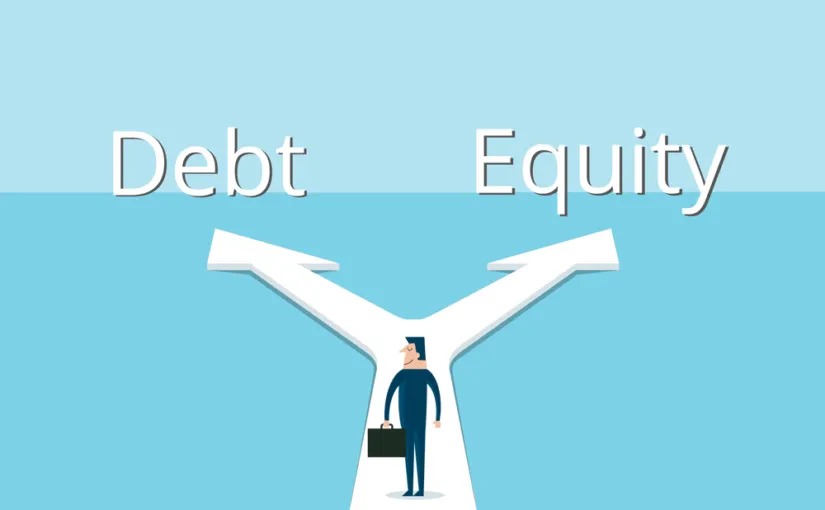As a Nigerian business owner, choosing the right financing is crucial for your company’s growth and success. Knowing the key difference between equity and debt financing in Nigeria, you can make better choices for your business and your finances. This essay will discuss the essential differences between equity and debt financing in Nigeria, focusing on their specific features, pros, and cons. By the end, you’ll better understand which type of financing might work best for your business. Learn more about financing a company and determine what makes stock and debt financing different.
How to understand equity financing
Selling people shares of your business is one way to get equity financing. By giving investors a piece of your business, you can get the money you need in exchange for ownership shares. Understanding equity financing is crucial because it shows one of the critical differences between equity and debt financing in Nigeria.

How to get equity financing
In essence, when you choose stock financing, you ask investors to become part owners of your business. These investors could be venture capitalists, angel investors, or even people who have invested money in crowdfunding. They get shares in your company in exchange for their money. This gives them a right to a share of your profits and a say in business decisions.
Pros of equity financing
- No obligation payment: You don’t have to pay it back. You don’t have to make regular payments when you get equity financing instead of loan financing. This can make your cash flow much more accessible so that you can put gains back into the business.
- Shared risk: When investors put money into your business, they share the risk of it failing. You don’t have to pay back the investment if your business runs into money problems like you would with a loan.
- Access to knowledge: Investors, especially venture capitalists, can help your business grow by giving you access to expertise, guidance, and networks.
Cons of financing with equity
- Watering down of ownership: When you sell shares, you give up a piece of your control. This could make it harder for you to make decisions about the business, which could be better if you want to stay in charge.
- Sharing the profits: Investors want a return on their money, so you’ll give them a cut of your earnings. This could mean you have less profit to put back into your business.
- Time and complexity: Getting equity funding can be difficult and takes a lot of time. It involves a lot of research, negotiations, and legal steps.
Equity financing could be a good choice if you want to get money without worrying about paying it back and are okay with giving people a piece of your business and your profits. It helps new industries and companies in fields with a lot of growth the most. By understanding these aspects, you can better appreciate the differences between equity and debt financing in Nigeria and make an educated choice for your business.
How to understand debt financing
You can also get money for your business through debt lending. With this method, you borrow and repay it over time, usually with interest. To understand the main differences between stock and debt financing in Nigeria, you need to know about debt financing.
The process of financing debt
When you choose debt financing, you borrow money from a lender, like a bank, a microfinance company, or the government. You agree to repay the loan amount (the capital) plus interest over time. The loan deal spells out repayment terms, such as interest rates and due dates.
Pros of debt financing
- You can keep ownership: You still own your business outright, which is one of the best things about loan financing. You don’t have to give up any control or share income with investors like you do with equity financing.
- Pros of taxes: Most of the time, you can subtract the interest you pay on business loans from your taxes. This can help you spend less in taxes overall.
- Payments You Can Expect: With debt financing, you have set repayment times, which makes it easier to plan and budget for your money needs.
Cons with debt financing
- You have to pay it back. No matter how well your business does, you must repay the loan. This can make it hard to pay your bills, especially if your business could be faster.
- Credit needs: A good credit background and collateral are often needed to get a loan, which can be challenging for new or small businesses.
- Risk of over-leverage: If you take on too much debt, you may have too much leverage, raising your financial risk and making it harder to get financing in the future.
You can use debt financing if you want to keep complete control of your business and have a clear plan for paying back the loan. You can get it if your company has a steady cash flow and can meet the credit standards. If you understand debt financing, you can better compare the differences between stock and debt financing in Nigeria and pick the one that works best for your business.
What makes equity and debt financing different
To make intelligent choices about funding your business in Nigeria, you must know the main differences between stock and debt financing. Each type of financing has its features, pros and cons that can significantly affect the growth and running of your business.
- Having control and ownership
- Capital from buyers: With this type of financing, you sell buyers shares of your business. In other words, you give up some of your ownership and power. Investors may have a say in big business choices and hope to get a cut of the profits.
- Debt financing means taking out a loan to pay for something. You must repay the loan with interest but keep full ownership and control of your business. The lenders don’t have a stake in your business and can’t change your choices.
- Obligations to pay back
- Equity financing: You don’t have to pay anything back with equity financing. Investors get their money back in the form of income and capital gains if your business makes money and grows. You don’t have to worry about making regular payments, which can help you keep track of your cash flow.
- Debt financing: With debt financing, you must pay back the initial amount plus interest regularly, as agreed upon. This could mean you have a steady financial obligation to meet no matter how well your business does, which could strain your cash flow.
- Risk and gain
- Equity financing: Investors in stocks take on more risk because their money depends on how well the business does. If your business fails, they lose their investment. If, on the other hand, your business does well, they can get significant gains.
- Debt financing: Lenders face less risk than equity investors because they are promised repayment plus interest. However, lenders usually get a set return less than the possible return from equity investments.
- Cash flow and business health
- Equity financing: Since you don’t have to pay it back, it can help you improve your cash flow, especially for new and growing businesses. You might be able to put the money you make back into the company this way.
- Debt financing: The regular payments that debt financing requires can affect your cash flow. Businesses need to make sure they make enough money to meet these responsibilities without putting their finances at risk.
- Being flexible and easy to get to
- Equity financing: You can get more freedom by working out the terms with the partners. However, it might be harder to get equity funding, especially if the business is new or small and has no history of success.
- Debt financing: Businesses that have been around for a while and have good credit are usually better able to get debt financing. The terms are more precise and more structured than with stock financing, but this can also mean that you have less freedom.
Selecting Between Financing with Equity and Debt
When choosing between equity and debt funding, you should consider your business’s stage, financial health, growth potential, and personal preferences for risk and control. If you know the main differences between equity and debt financing in Nigeria, you can pick the best choice that fits your business goals and budget.

Things to think about when picking between debt and equity financing
It’s essential to consider many things when deciding between equity and debt financing in Nigeria to make the best choice for your business. Keep these crucial things in mind:
- Business stage: Think about what stage your business is in. Startups and early-stage firms may be more interested in stock financing because it gives them money without the pressure of paying it back immediately.
- Growth plans: Consider how you want to grow and how much money you’ll need. Stock financing might be a better option if you think your business will overgrow and need a lot of money immediately. But debt financing might be better if you know how much money you’ll have coming in and out and would rather have an organised repayment plan.
- Ownership and control: Think about how much ownership and control you’re ready to give up. When you get equity financing, you share ownership with investors, which means you both have a say in decisions. You keep complete control when you use debt financing but must pay it back.
- Your business’s financial health and ability to make regular payments should be considered. Deb financing may be a good choice if your business consistently makes money and can easily handle debt payments. Equity lending is a better option if your cash flow could be more steady.
- Danger tolerance: As a business owner, determine how much danger you will take. Equity financing doesn’t require repayment, so you take less financial risk. However, it also means giving investors a piece of the profits. When you borrow money, you risk defaulting if you can’t repay it.
- Growth potential: Look at how your business can grow and its long-term chances. If you get equity financing, you can find experienced partners willing to help your business grow through advice and connections. Debt financing lets you keep full ownership of your business and could give you more significant gains if it does well.
- Cost of capital: Compare the costs of equity and debt capital. Equity financing may cost more in the long run because buyers can make much money. Debt financing includes fixed-interest payments. These payments can be planned but may add up over time.
- Connections with investors: Think about how important it is to connect with investors. To get equity financing, you must find investors who care about your business’s growth and keep in touch with them. Debt financing involves signing a contract with a lender, but the relationship between the borrower and lender usually ends after the loan is paid back.
- Legal and regulatory issues: Learn about the legal and regulatory issues that come up with Nigeria’s equity and debt financing choices. Follow the laws and rules that apply to stay out of trouble with the law in the future.
If you carefully consider these things and understand the differences between Nigerian stock and debt financing, you can choose to fit your business goals and your budget.
Case studies of businesses in Nigeria
Looking at real-life cases can help you understand how Nigerian businesses deal with the differences between debt and equity financing:
- Flutterwave: This Nigerian banking startup chose debt financing when it first started. By getting money from well-known partners such as Y Combinator and Greycroft Partners, Flutterwave was able to grow its business and enter new African markets quickly. Equity financing gave Flutterwave access to the money it needed to succeed without paying it back immediately.
- Farmcrowdy: As a Nigerian startup, Farmcrowdy picked a mix of equity and debt financing to run its business. At first, the company got equity funding from investors in the United States and other countries to get its business plan of matching farmers with sponsors off the ground. In later years, Farmcrowdy added debt capital through loans and grants to help it grow into new agricultural areas and sectors. With this mixed method, Farmcrowdy could carefully use investment capital and debt facilities.
- Konga: Konga, a well-known Nigerian online market, relied on debt financing to help it grow in e-commerce. Konga got big loans for marketing campaigns, new technology, and infrastructure by forming partnerships with banks and private lenders. Konga was able to get the capital it needed to fight the tough e-commerce market through debt financing while still keeping control of its operations and ownership.
- Paystack: Paystack is another successful startup in Nigeria’s ecosystem. To reach its growth goals, Paystack used both equity and debt funding. Paystack started with money from well-known angel investors and venture capital companies. It then used equity financing to build its payment processing platform and attract customers. As the business grew, it increased its initial funding with debt financing from banks and other financial institutions to cover running costs and working capital needs. This balanced method helped Paystack keep growing while also doing an excellent job of managing financial risk.
These case studies show the different ways that Nigerian businesses get money and understand the critical differences between equity and debt financing in Nigeria. By looking at these examples, you can learn a lot about how different types of financing can be used in real life and then change your method to fit the needs and goals of your business.
Read Also.What Are The Best Ways For Nigerian Businesses To Use Digital Marketing?
Conclusion
Finally, Nigerian businesses need to know the critical differences between equity and debt financing in Nigeria. With this information, you can make intelligent choices to help your business grow. Are you ready to move on? You can increase your brand visibility by adding it to our list. Take advantage of this chance to show off your business. Sign up now to enter the Nigerian market and start making money there!



